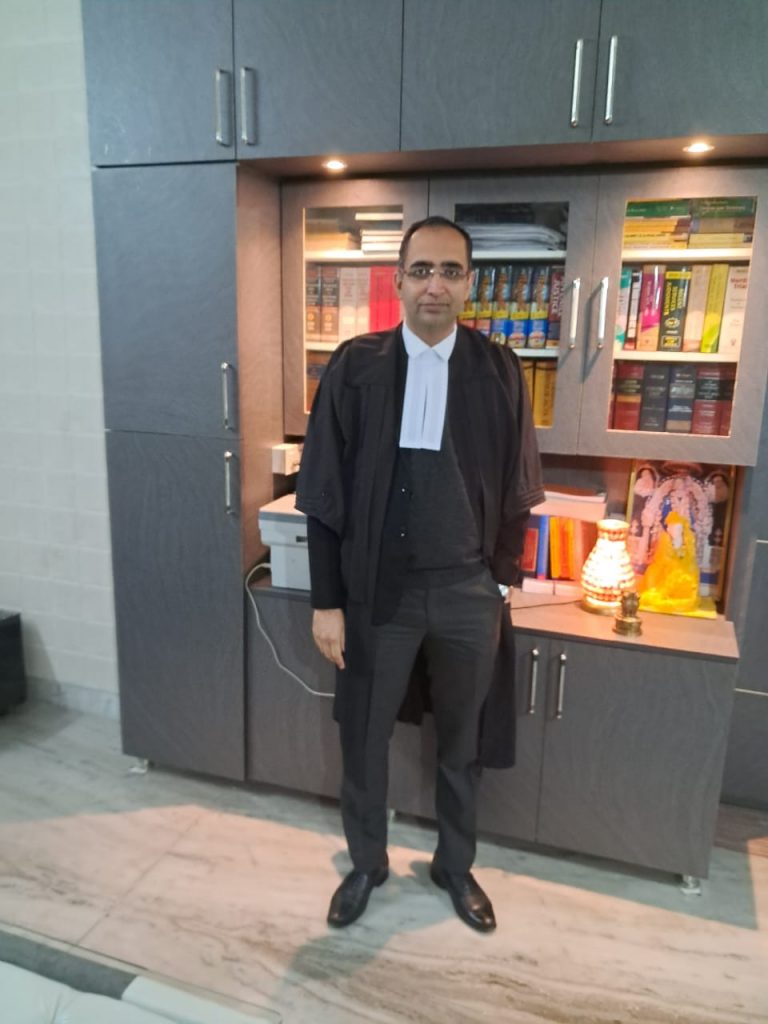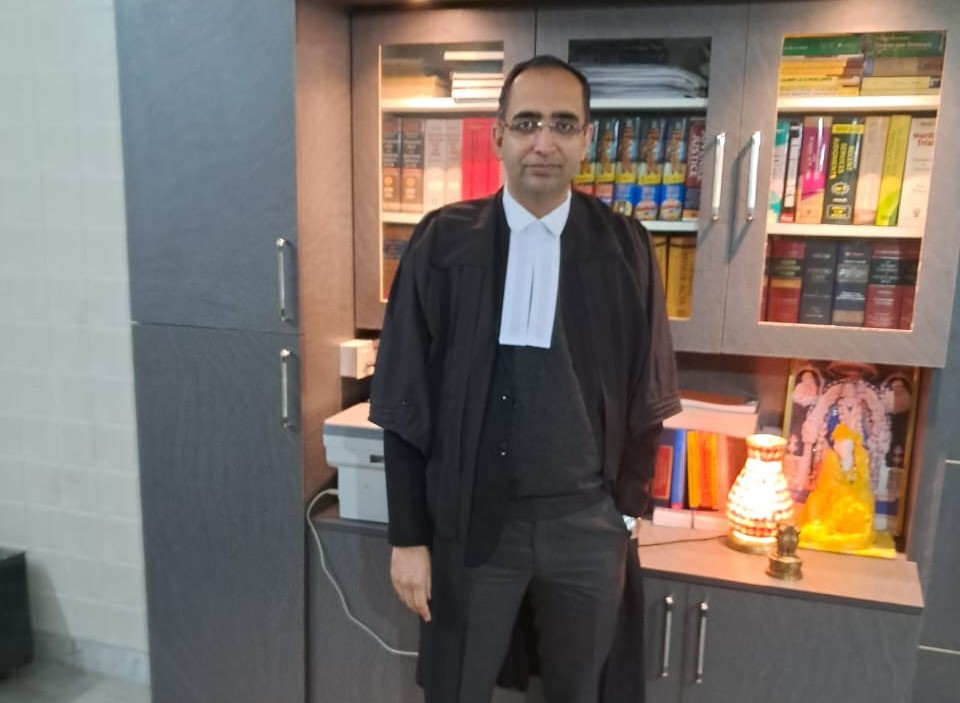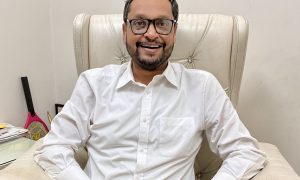This Interview has been published by Pragya Chandni and and The SuperLawyer Team

Can you share the pivotal moments that led you to pursue a career in law, from your LL.B. at Maharaja Ganga Singh University to becoming an Advocate on Record at the Supreme Court of India?
Honestly, I admit that I am an accidental Advocate. I had never thought to pursue LL.B. and practice Law. Rather, I first visited Courts, on the day of joining in the profession as an intern at District Courts, Ludhiana in February, 2012. I am basically a physiotherapist and even worked as respiratory physiotherapist at Dayanand Medical College and Hospital, Ludhiana before starting my independent practice as physiotherapist. My father was a bank officer and I also wanted to join Government Service, so I tried my luck in UPSC and developed interest in the Constitution of India. During my job as physiotherapist, I developed a habit of using the library in 2008. That was the turning point of my life.
But destiny wanted me to join the legal profession, as one of my friends during my UPSC preparation advised me to pursue LL.B. It was November, 2009 and admissions were closed as the examination was scheduled for March, 2010. My friend who was already pursuing LL.B. from that University advised me to visit college. I got admission on payment of late fees and penalty. My friend left LL.B. after second year but I continued and completed my degree. I started my career in the Chamber of Sh. Amandeep Singh Grewal at District Courts, Ludhiana in 2012. Being from a medical background, I have keen interest in reading, subscribed to quarterly law journals to keep myself updated since the beginning of my career and even opened a small office at Ludhiana. Sh. Davinder Pal Singh, my dear friend and senior, gave me the opportunity to address the judicial magistrate on preliminary summoning in 138 N.I. Complaint. He had also trusted my abilities and referred to a proclaimed quashing to me during earlier days at High Court. In 2013, a retired bank officer visited my office to claim benefits as he was dismissed by disciplinary authority in 2001 and reinstated by appellate authority in 2003 with punishment for stoppage of increments for 5 years. The bank counted 5 years from 2003 instead of 2001. Being fresher, I was reluctant to take his case whereas the client not only trusted my ability but motivated me to proceed with his Civil Writ Petition. I learnt High court etiquettes on observing advocates while waiting for my turn at Punjab and Haryana High Court, Chandigarh. The notice was issued and thus started my journey at Punjab and Haryana High Court. Similarly, I was successful in getting the Proclaimed Order quashed without even issuance of notice to the respondent by Punjab and Haryana High Court. So, people started referring to my work.
I was appearing before DRT, Chandigarh and other forums as well because I never wanted to specialize but to expand my wings. It was tough during initial years but I never stopped and kept moving with the flow. Thereafter, in 2017, an advocate referred me two Special Leave Petitions pertaining to bail in 420 IPC. I contacted Ms. Manju Jately, AOR for filing and started appearing as arguing counsel before Supreme Court. During lockdown, I planned for AOR examination as Court work was limited, so joined Ms. Manju Jately as a trainee. I appeared in AOR examination in December, 2021
but could not make it in the first two papers because simultaneously I was pursuing LL.M. As such, I was determined to become AOR and succeeded in April, 2023.
You’re currently pursuing a Ph.D. at Rajiv Gandhi National University of Law, Punjab. How do you balance your academic commitments with your active legal practice, and what motivates you to continue your scholarly pursuits?
It is really difficult to pursue both things together but my friends and associates helped me during mandatory Ph.D. coursework. The Ph.D. research has helped me to refine my legal skills and knowledge. The research work does have an impact on my professional career. As my supervisor has shared a time Schedule to complete various stages of the research, therefore, I have become selective in accepting matters since 2022. I have a library in my office and I even use the Court Library during free time at courts to continue my research. I have also got a new teaching assignment and was invited by Punjab Police Academy for training of Punjab Police Officers. I was felicitated by the Director, Punjab Police Academy and this motivated me to pursue my research further. To curb the pressure, I have already closed Facebook and other social media applications. I am going to shift to keypad mobile to save myself from distraction and limit internet usage.
You’ve qualified in the Canadian Law examination. Could you elaborate on your interest in international law and how it has influenced your practice in India?
I had planned to migrate and therefore, wanted to pursue a career in law after migration. I applied for assessment before migration to Canada in 2015. But I did not find Canada as a place to live for the rest of my life and returned back. To enhance my skills and legal acumen, I appeared in examinations conducted by the National Committee on Accreditation for law society of Canada. I have been influenced by many legal issues and have even included in my professional and academic life to name a few:-
The Canadian Supreme Court decision on disclosure influenced me to a great extent. The Court in William W. Stinchcomb v. Her Majesty The Queen held that “The Crown has a legal duty to disclose all relevant information to the defence. The fruits of the investigation which are in its possession are not the property of the Crown for use in securing a conviction but the property of the public to be used to ensure that justice is done. The absolute withholding of information can only be justified on the basis of the existence of a legal privilege and privilege is reviewable”.
As I wanted to do something on disclosure by prosecution in India, so this is my research topic in Ph.D. During interview for Ph.D., Prof. (Dr.) G.S. Bajpai, Vice Chancellor, RGNUL (Punjab) appreciated my research interest in disclosure and advised me to conduct pilot study. I have also got an article published on “Inconspicuous Duty of the Prosecution to Disclosure” in Criminal Law Journal, March, 2022. My Supervisor, Dr. Shiva Satish Sharda at RGNUL, Punjab has also motivated me to pursue comprehensive research so as to work in directions for necessary amendments in legal regime looking
problems of overcrowding of prisons, increasing under-trials population and low conviction rate in India.
I am also advising during training to the Police Officers at Punjab Police Academy to respect the fundamental rights of accused and disclose the fruits of investigation to avoid false prosecution. I have even impressed the trial court for disclosure of withheld exculpatory evidence collected by the investigating agency in one or two criminal trials.
The Model Code of Professional Conduct is another area which helped me to learn lawyer’s ethics and was useful in AOR examination. The Model code forbids the lawyers to advise clients to initiate criminal and quasi criminal proceedings to secure satisfaction of private grievances. But it is common in India to initiate criminal proceedings to threaten or intimidate the opponents for personal matters like financial disputes, property matters, family disputes including marriage and custody of children
and sometime even the consensual sexual relations are given the color of rape as recently noticed by Madhya Pradesh High Court. The tactics to use criminal law for monetary gains need to be checked for a healthy Indian Society. I feel it is a misuse of the judicial process and sensitization of different stakeholders is necessary to avoid misuse of criminal law for personal satisfaction.
Your practice spans across various courts and tribunals, dealing with a wide range of cases. How do you manage such a diverse portfolio of legal matters, from civil writs to criminal appeals and everything in between?
My mentor has been dealing with both civil and criminal matters but he has not been dealing in service matters. I got an understanding of service law as my father retired as a bank officer and my first matter at High Court pertains to service matters of a retired bank employee only. I am always keen to learn and spread my wings, therefore, I shifted to Punjab and Haryana High Court, Chandigarh. Being the capital of two states, there are various forums. As such, I never denied matters for forums like DRT, State Consumer Commission, Human Rights Commission and NCLT. The initial foundation days gave me exposure to both civil and criminal branches of law before various forums.
I have been associated with the Department of Defence welfare (Punjab) since 2019 and this has helped me to refine skills in civil writs and service matters including departmental disciplinary proceedings. Even today, I take original civil and criminal matters before all courts because I believe one should not stop learning and limit oneself to any stream of law. One needs to accept change and challenges of life with open arms and mind. Litigation is a team work, I have always been assisted by friends, colleagues and even my senior appears for me at District Courts whenever required because I could not spare except Saturday for District Courts. Lastly, I am indebted to my associates and clerks at Supreme Court, New Delhi, Punjab and Haryana High Court, Chandigarh and District Court, Ludhiana for timely filing, without whom, it is not possible to appear at different courts.
Your civil writ petition in 2019 regarding CCTV installations in polling booths received media coverage. How do such cases with public interest components shape your approach as a lawyer, and what impact do you aim to achieve beyond legal resolutions?
There is a difference between Public and Publicity Interest Litigation as recently highlighted by the Former Chief Justice of India. I never used PIL jurisdiction for publicity and have not received any case even if any matter is reported in the media. I am very particular about professional ethics. The civil writ petition pertaining to CCTV installations in polling booths was pro bono and I mentioned the same in morning to get it listed in afternoon. The Court found legal points in the matter and issued directions to install CCTV cameras at Polling Booths with the objective of fair election looking at apprehensions of the petitioner. An advocate being aware of the constitutional and statutory rights of the people and citizens of India, must use its expertise for the welfare of the society. I am impressed by Sh. Mahatma Gandhi, father of nation, the way he used his legal expertise against oppressive law in South Africa and he is being recognized globally for his welfare activities and Indian struggle for independence. Similarly, one should not limit his legal expertise for dispute resolution but work for social welfare and learn from seniors in the profession.
You’ve provided legal opinions for Indian Express Pvt. Ltd. Can you share an instance where your legal advice played a crucial role in the resolution of a complex legal matter?
I have been associated with Indian Express since 2017 and contested their civil matters at District Courts, Ludhiana and Chandigarh and NCLT, Chandigarh. But, I have been specifically engaged by Indian express in 2019, to carry out the thorough legal search and submit a report on the status of the complainant partnership firm as directed by the Supreme Court in a defamation complaint against Chairman, Indian Express pending before Chief Judicial Magistrate, Ambala. On the basis of the report, the Supreme Court quashed the criminal complaint and summoning order issued in 2000 against the Chairman, Managing Director and Editorial Director of the Indian Express Group.
You’re actively involved in legal awareness programs and social welfare activities. How do you believe legal professionals can contribute to the betterment of society beyond their regular legal practice?
I feel it is the duty of every person to contribute to society. So, to repay the debt of what has been gained by me during the course of professional and personal experience, I try to volunteer within my limits and even try to settle the family and personal matters at the pre-litigation stage with honest advice. One can contribute by organizing camps at villages and also by starting lecture series for different stakeholders. Our government needs good legal instructors with bare minimum expenses, therefore, one can apply as instructors/trainers at different training governmental and non governmental institutes or organizations. In the world of the internet, social media is a good platform for necessary legal education. The legal awareness and education should not focus on work procurement but with welfare objectives. Presently, the crime against children is rising and therefore, I feel it is important to sensitize the people with sex education, penalties in sexual crimes. People need to be aware of fundamental duties as well rights because duties are equally important as rights. The most important duty of every advocate is to educate the youth of the nation as most of them, due to physical interaction indulge in activities forbidden by law and destroy their career and life.
Considering your extensive experience, what advice would you give to law graduates who are just starting their careers in the legal field?
The first lesson, my senior taught me that never run for money but work hard, the money will follow you. India is a developing nation, where people need affordable and quality legal assistance. There is no dearth of work and the only precondition is hard mental labor to update oneself with all facts and relevant legal issues. There is neither any shortcut nor scope of smart work in the legal field. Last but not least, honest efforts by lawyers, honest thorough presentation to court and honest updated advice to clients. Honesty, dedication and hard work automatically pay back. Failure does not determine success but the response to it. Therefore, always be ready to learn, unlearn and relearn.
In the end, I am grateful to the SuperLawyer Team for this interview.
Get in touch with Saurabh Kapoor-


























